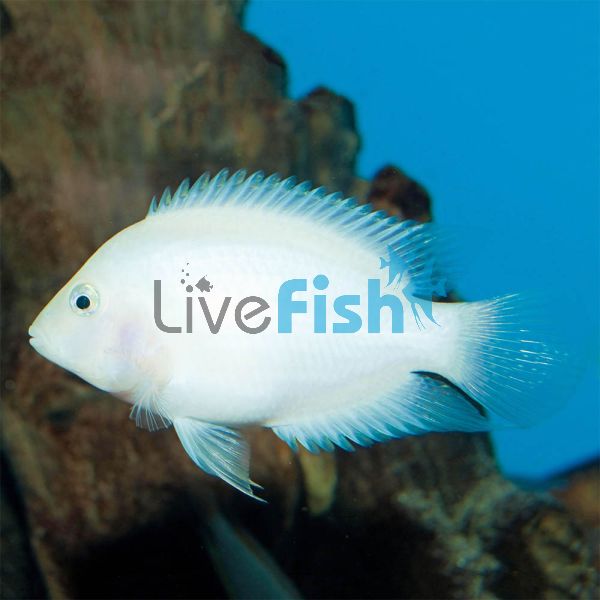White Convict Cichlid 5cm
This aquarium-bred strain is just as hardy as the wild type. Convicts are an ideal beginner's fish for anyone wanting to enjoy the sight of a cichlid pair raising their fry. They are extremely hardy and breed readily - even when in the presence of much larger fishes. They are very territorial when breeding, so tankmates should be robust or agile species. Males develop longer fins and ripe females often display red in the dorsal fin and on the abdomen. Males grow to about 12cm, females to 8-10cm.
This aquarium-bred strain is just as hardy as the wild type. Convicts are an ideal beginner's fish for anyone wanting to enjoy the sight of a cichlid pair raising their fry. They are extremely hardy and breed readily - even when in the presence of much larger fishes. They are very territorial when breeding, so tankmates should be robust or agile species. Males develop longer fins and ripe females often display red in the dorsal fin and on the abdomen. Males grow to about 12cm, females to 8-10cm.
More than 225 species, with estimates of 300 species, of cichlids are found throughout South America. An estimated 75% of these inhabit the mighty Amazon River Basin. Cichlids are also found in Central America, where they are well-known for their pugnacious behavior and stunning colors. Most of these cichlid are large, thus requiring large tanks. These fish inhabit most types of waterways throughout Central America including lakes, streams, rivers, and even underground water sources.
Their colorful appearance, the many different species available, their behavior and their breeding are just some of the reasons the Cichlids are one of the most popular aquarium fish.
Due to their aggressive behavior, the tank for cichlids should be as large as possible, with its length being more critical than its height; meaning the longer the better.
In the Cichlid tank, there must be places of refuge. These can be rock caves, large pieces of driftwood, or even inverted flowerpots. Most large species of Cichlids will dig up the substrate material and occasionally will remove plants from the substrate. The Angelfish, Discus, and the dwarf species Apistogramma all prefer a densely planted tank.
The water temperature should be in the range of 24-28 degrees Celsius, slightly higher for the Discus. The diet should consist of live and frozen food of all kinds as well as a large flake staple food. Large specimens can be fed Earthworms, garden Crickets, and kitchen leftovers.
| Scientific Name | Amatitlania nigrofasciata |
|---|




